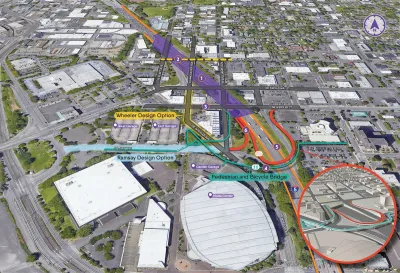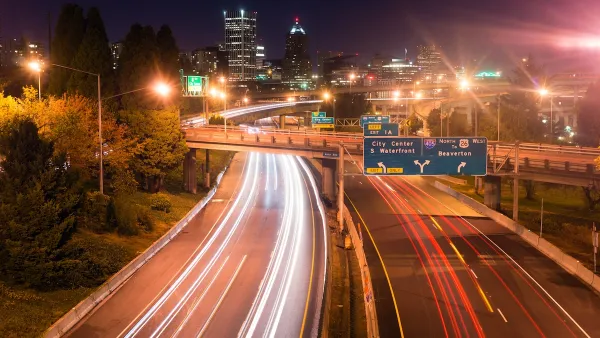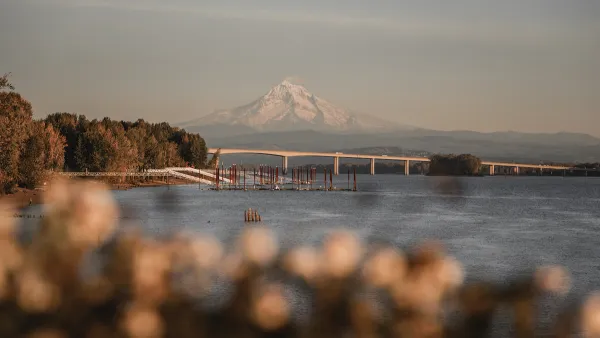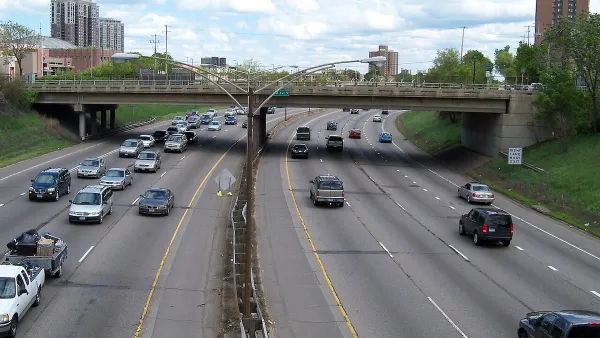The Oregon DOT is requesting a federal grant to fund a controversial freeway expansion through the Rose Quarter.

Environmental and sustainable transportation advocates in Portland, Oregon are urging federal officials to oppose a proposed expansion of the Interstate 5 freeway through the city’s Rose Quarter.
A grant being considered by the U.S. Department of Transportation (USDOT) could “make or break” the project, according to an article by Taylor Griggs in the Portland Mercury. “Freeway expansion opponents argue ODOT has concealed the true environmental costs of the Rose Quarter project in order to present it as a sustainable and equitable investment in Portland’s future. But their opposition to the grant award puts them at odds with local government officials and several community organizations, who have also written USDOT with letters of support.”
ODOT’s current plan involves new auxiliary lanes in both directions of the freeway. After years of backlash, the department agreed to sink the freeway and add new surface connections above. “ODOT says the cover will be able to support residential and commercial buildings, and will make it easier for people walking, biking, or rolling to get around. The project also includes a plan to build a pedestrian and bicycle bridge over I-5 near the Moda Center.”
Although it received a $450 million Reconnecting Communities grant, the cap plan, developed with “strong input” from community advocates, is largely unfunded and could cost up to $1.9 billion.
Advocates including Joe Cortright and Chris Smith, founders of No More Freeways, recommend that USDOT award a smaller, $400 million grant geared toward completing a proposed pedestrian and bike bridge. In a letter, Cortright and Smith said “the project is engineered to be vastly wider than needed,” doubling the width of the freeway. “Ultimately, advocates from groups like No More Freeways say the RCN program cannot coexist with a USDOT that doles out federal funding to polluting, harmful freeway expansions.”

National Parks Layoffs Will Cause Communities to Lose Billions
Thousands of essential park workers were laid off this week, just before the busy spring break season.

Retro-silient?: America’s First “Eco-burb,” The Woodlands Turns 50
A master-planned community north of Houston offers lessons on green infrastructure and resilient design, but falls short of its founder’s lofty affordability and walkability goals.

Delivering for America Plan Will Downgrade Mail Service in at Least 49.5 Percent of Zip Codes
Republican and Democrat lawmakers criticize the plan for its disproportionate negative impact on rural communities.

Test News Post 1
This is a summary

Test News Headline 46
Test for the image on the front page.

Balancing Bombs and Butterflies: How the National Guard Protects a Rare Species
The National Guard at Fort Indiantown Gap uses GIS technology and land management strategies to balance military training with conservation efforts, ensuring the survival of the rare eastern regal fritillary butterfly.
Urban Design for Planners 1: Software Tools
This six-course series explores essential urban design concepts using open source software and equips planners with the tools they need to participate fully in the urban design process.
Planning for Universal Design
Learn the tools for implementing Universal Design in planning regulations.
EMC Planning Group, Inc.
Planetizen
Planetizen
Mpact (formerly Rail~Volution)
Great Falls Development Authority, Inc.
HUDs Office of Policy Development and Research
NYU Wagner Graduate School of Public Service





























